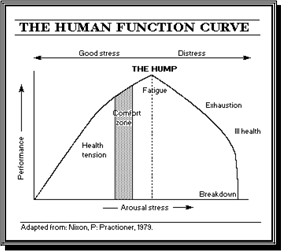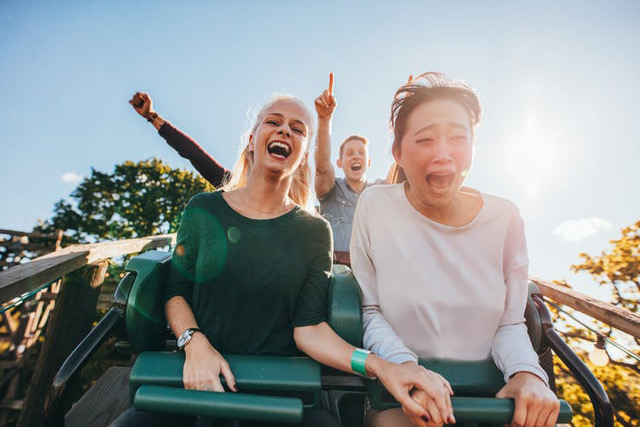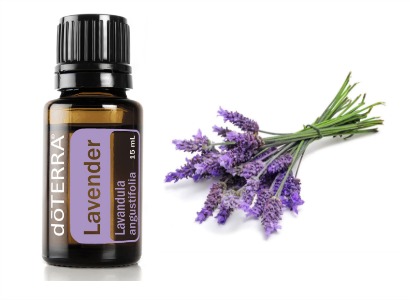
From Dis-stress To De-stress
9th Apr 2019
In case you didn’t know, the whole of April has been designated stress awareness month. Stress even has its own website. Who knew…..
Back in 1936 when Dr Hans Selye coined the term stress to describe “the non-specific response of the body to any demand for change”, I bet he never imagined one day there would be a worldwide stress epidemic. Stress has possibly become one of the most used words in the English language and is one of the few words that has been absorbed into other languages in English.
 After it became apparent that people were viewing stress in an unpleasant, negative way Dr Selye had to come up with another word, stressor, to distinguish stimulus from response. We tend to equate stress with distress, defined as a “physical, mental, or emotional strain or tension” or “a condition or feeling experienced when a person perceives that demands exceed the personal and social resources the individual is able to mobilise”.
After it became apparent that people were viewing stress in an unpleasant, negative way Dr Selye had to come up with another word, stressor, to distinguish stimulus from response. We tend to equate stress with distress, defined as a “physical, mental, or emotional strain or tension” or “a condition or feeling experienced when a person perceives that demands exceed the personal and social resources the individual is able to mobilise”.
There is also of course good stress, which Dr Selye described as eustress. This is the sort of stress that helps us in meeting deadlines or with productivity, as shown in the illustration on the left. However, there is a tipping point and this differs for each one of us, after which things can go rapidly downhill. This is when we should heed the early warning signs and symptoms that suggest we are reaching the point of overload.
A good analogy to describe our individual response is that of a roller coaster ride. Some on the ride would sit at the back, knuckles clenched on the safety bar with their eyes closed, wondering why they had got on in the first place. At the front you have the thrill seekers who embrace the whole experience, yelling with delight as they enjoy each steep plunge and who can’t wait to get to the next ride. Somewhere in the middle you may find a few who are just going with the flow and may even feel a bit bored.
The rollercoaster is the same stressor for all the passengers. It is their perceptions and expectations that differ and create an individual response.

It’s the same in everyday life. How we perceive things can affect our stress levels.
From the moment we get up it can be a race against the clock – to get to work on time, to get the children to school, to negotiating the commute. It continues on through the day – busy schedules, work deadlines, appointments to keep and so on.
We make choices to eat less than healthy food, sometimes on the go. We make choices to drink too much alcohol, to stay up late and watch tense thrillers or horrible news. We can make different choices.
The Stress Response
When our bodies experience stress a complex hormonal response is triggered via the hypothalamus-pituitary-adrenal (HPA) axis and the adrenal glands produce adrenaline and cortisol to help our bodies cope. This is what gives us the energy to run from that proverbial sabre-toothed tiger we often hear about. Our sympathetic nervous system (SNS) is engaged and we are ready for ‘fight or flight’.
This ‘fight or flight’ state can damage our brain and body tissues resulting in health problems. We are not designed to be in this state all of the time and when we are, we can start to ‘burn out’. We are constantly having to produce the stress hormone cortisol and risk becoming resistant to it, having to produce more to get the same effects.
This constant state of high cortisol can wreak a lot of damage and has been linked to:
- Insulin resistance and diabetes
- Increased belly fat
- Anxiety and depression
- High blood pressure
- Low energy
- Suppressed immunity
The opposite of this state is parasympathetic nervous system state (PSNS) and this is ideally the state we need to be in for 90 – 95% of the time. This is the state that allows our bodies to relax, repair and digest and to function optimally.
Our ancestors enjoyed a far better balance between these two states than we do today. Being in this ‘fight or flight’ state has become a chronic issue, exposed as we are so constantly to stress. Our bodies are constantly in reaction and we don’t have the chance to recuperate properly.
Recognising the sources of stress is an important start to dealing with this problem. They can come from external factors. A great deal of stress comes from invisible and internal factors such as:
- Emotional conflict
- Exposure to environmental toxins
- A diet high in sugar and starches
- Blood sugar imbalances
- Systemic inflammation
- Chronic pain
- Food intolerances
- Poor sleep
Clearly dealing with stress is a priority from a health point of view. So how can we best mitigate the effects of stress?
We can never eliminate stress from our lives completely. However, there is a lot we can to support the way our body deals with stress and benefit in the long run.
From Dis-stress to De-stress: Ten Strategies to develop Resilience
- And breathe………consciously that is: This is free and can be done anywhere, anytime. Few people really breathe properly and many of us have bad breathing habits such as over-breathing, chest breathing and holding your breath. Habits like these can create a shortage of oxygen and energy and are extremely stressful to the body. If necessary do some research to develop better habits.
- Sleeping soundly: Value the time you spend in bed. Switch off your devices earlier. Many people are in the dark about the negative, stressful effects of blue light. If you are suffering with persistent insomnia you may need to seek support to get to the root cause. Limiting exposure to blue light after dark is a good start. Research ‘sleep hygiene’.
- Eating well and wisely: Ideally we need to be consuming nutrient dense, unprocessed wholefoods that have not been messed with in a factory. Focus on eating seasonally and locally as far as possible. It costs less to eat this way and it makes shopping a lot simpler. Choosing organic where possible lowers the stressful impact of toxins on our gut microbiome. Making better choices and avoiding highly processed food like products is critical for balancing blood sugar and stress management.
- Targeted supplements: I’m a firm believer in getting what you need from an optimal diet though there are times when the use of specific targeted supplements can be very useful, especially in negating the effects of stress.
- Adaptogens are compounds found in certain herbs that help to stabilize body systems. Adrenal adaptogens help counteract the negative effect of stress and include:
- Ashwaganda – a personal favourite
- Rhodiola
- Panax Ginseng
- Siberian Ginseng
- Holy Basil Leaf Extract – also available as an essential oil
- Magnesium: This vital mineral, involved in activating 700 – 800 body enzyme systems, can be seriously depleted by stress. The best magnesium supplement in my opinion is ReMag. This was developed by Dr Carolyn Dean, a renowned expert on magnesium and is 100% absorbed (unlike other forms of magnesium. It comes in liquid form and is available in the U.K. from a company called Botanica Health. Seeking the help of a qualified nutritional therapist would advantageous to find out how to balance this with Vitamins D and K2 and calcium.
- Taking Magnesium Chloride (or Epsom salts if you wish) bath at night is a great way of absorbing magnesium and can contribute to better sleep especially if you add essential oils to maximize the benefit. A Lavender and Cedarwood combo are among my particular favourites.
- Pantethine (B5) and B vitamins in general are necessary for the manufacture of adrenal hormones. When we are under stress we tend to have a greater loss of B vitamins. As well as optimizing our dietary intake we may do well to find a good wholefood state supplement.
- Adaptogens are compounds found in certain herbs that help to stabilize body systems. Adrenal adaptogens help counteract the negative effect of stress and include:
- Meditation: This can take some time to master. The monkey brain kicks in. Remember these are just thoughts. Acknowledge them and let them drift by. Meditation techniques are readily available online and are worth checking out.
- Laughter is the best medicine: Laughter and finding enjoyment in life are a great antidote to stress. Having a positive mindset and being optimistic builds resilience and can contribute to longevity.
- Connection: We are hard wired as humans being for connection to one another. Loneliness and the feelings of isolation this engenders are very stressful for the mind and body. Modern day exacerbates isolation for many.
- Get out in nature: A new trend in the U.K. is forest bathing. This originated in Japan and is now a cornerstone of Japanese healthcare. The science is there to back up what is old knowledge and wisdom. Taking a long, slow walk and using all of your senses to absorb the special atmosphere in a forest gives us the opportunity to benefit from chemicals released by tress called phytoncides which have a positive effect on the immune system.How many hours do you spend in what is essentially a blue lit cave? This is unnatural and yet has become ‘normal’ for many people. Days, weeks, months go by without any connection with nature. Go and recharge on a regular basis. Make it a priority for the sake of your health.
- Grounding and earthing: This refers to connecting electrically with the earth. An increasing amount of research is finding this has numerous health benefits. To achieve this our skin needs to touch the bare earth, be it grass, sand, water or any conductive surface. It’s simple, free and effective. Take your shoes off and connect with mother earth. In a forest…with some friends…having a laugh…
 Essential oils: amazing gifts from nature. I love using oils as I find them really accessible. Just gently inhaling from a bottle of Wild Orange oil is so uplifting. A whiff of Lavender last thing at night is well known for its relaxing properties. I love using the doTERRA brand. They are a science company who have taken essential oils to a whole new level in terms of quality, potency, purity and ethical sourcing and have set their own high standards to guarantee maximum therapeutic value (not all essential oils are created equal!). For this reason they are the preferred brand of many doctors, surgeons, hospitals and researchers.
Essential oils: amazing gifts from nature. I love using oils as I find them really accessible. Just gently inhaling from a bottle of Wild Orange oil is so uplifting. A whiff of Lavender last thing at night is well known for its relaxing properties. I love using the doTERRA brand. They are a science company who have taken essential oils to a whole new level in terms of quality, potency, purity and ethical sourcing and have set their own high standards to guarantee maximum therapeutic value (not all essential oils are created equal!). For this reason they are the preferred brand of many doctors, surgeons, hospitals and researchers.
One powerful way of using essential oils is with the AromaTouch Technique Treatment. This is a massage style application of eight specific individual oils and blends and is a powerful way to de-stress. The oils also help with reduction of inflammation which can be caused and exacerbated by stress.
We can all make a conscious decision to make different more healthful choices and there is much we can do to support ourselves against stress. I shall give the last word to Dr Selye: “Adopting the right attitude can convert a negative stress into a positive one”.
***
If you want help to reset your diet and implement healthier choices, this April I am offering a limited number of 45-minute wellness and dietary assessment consultations for the very special price of £57.
I am also trained and accredited to give the AromaTouch Technique Treatment and am offering this powerfully relaxing treatment in a 45-minute session at Brighter Spaces in Guildford for the £47 (usual price £60).
—
This is a guest post by Naomi Rowling
Naomi Rowling BA Hons NT mNNA is a Nutritional Therapist in private practice at Brighter Spaces in Guildford.
